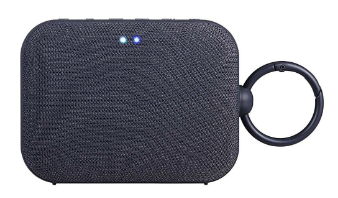LG PN1 Go Portable Bluetooth Speaker User Instructions

IMPORTANT SAFETY INSTRUCTIONS
- Do not use this apparatus near water.
- Clean only with dry cloth.
- Do not block any ventilation openings. Install in accordance with the manufacturer’s instructions.
- Do not install near any heat sources such as radiators, heat registers, stoves, or other apparatus (including amplifiers) that produce heat.
- Do not defeat the safety purpose of the polarized or grounding-type plug. A polarized plug has two blades with
one wider than the other. A grounding type plug has two blades and a third grounding prong. The wide blade or the third prong are provided for your safety. If the provided plug does not fit into your outlet, consult an electrician for replacement of the obsolete outlet. - Protect the power cord from being walked on or pinched particularly at plugs, convenience receptacles, and
the point where they exit from the apparatus. - Only use attachments/accessories specified by the manufacturer.
INSTALLATION
LED 1 (Battery LED) status
- Fully Charged: Green White (with the power on),
- Green Off (with the power off) / Charging: Red
LED 1 (Battery LED) status
- Green: ≥ 70 % / Amber: > 10 %
- Blinking red indicates the battery needs to be charged.

| Power | Power On / Off ……………………………… Press |
| Battery | Check Battery Status …………….. Hold 1 for 2 seconds |
| Bluetooth | To pair your mobile device, select LG-PN1(XX)from device list. (LED 2 (Bluetooth LED: Blink g ON)) |
| Bluetooth Initialization ……………. Hold for 7 seconds | |
| Playback Controls | Play / Pause ……………………………… Press Forward Skip …………………………….. Press X 2 Backward Skip …………………………… Press X 3 |
| Speakerphone | Receive / Disconnect ………………………… Press |
| Volume | Volume Control ………………………….. Press or |
| Voice Command | Use voice command of your smart device . . . . . . . . . . . . . . . . . . . . . . . . . . . . . . . . . . . . . . . . . . . . . . . . . . . Press . |
| Dual Mode | Hold button of each speaker for 2 seconds. (LED 1 (Dual Mode LED: Blink g ON)) |
Specification
Power Supply:
- 5 V 0 2 A (AC Adapter)
- Built-in rechargeable battery
- Power consumption: Refer to the main label.
Dimensions (W x H x D):
- Approx. 141.5 mm X 74.6 mm X 38.3 mm (5.57 inch x 2.94 inch x 1.51 inch)
- Operating Temperature: 5 °C to 35 °C (41 °F to 95 °F)
- Operating Humidity: 5% to 60%
- Water-proof: IPX5
- Degree of protection against jets of water.
- Battery Life: Approx. 5 hours (Varies by volume level and audio content.)
For models using a battery
This device is equipped with a portable battery or accumulator.
How to Safely remove the batteries or the battery pack from the equipment:
To Remove the old batteries or battery pack, follow the assembly steps in reverse order. To prevent contamination of the environment and bring on possible threat to human and/or animal health, the old batteries or the battery pack
must be put in an appropriate container at designated collection points. Do not dispose of batteries or battery pack together with other waste. It is recommended that you use local, free reimbursement systems batteries or battery packs. The batteries or the battery pack should not be exposed to excessive heat such as sunshine, fire or the like.
FCC Compliance Statement
This equipment has been tested and found to comply with the limits for a Class B digital device, pursuant to Part 15 of the FCC Rules. These limits are designed to provide reasonable protection against harmful interference in a residential installation. This equipment generates, uses, and can radiate radio frequency energy and, if not installed and used in accordance with the instructions, may cause harmful interference to radio communications.
- Reorient or relocate the receiving antenna.
- Increase the separation between the equipment and the receiver.
- Connect the equipment to an outlet on a circuit different from that to which the receiver is connected.
- Consult the dealer or an experienced radio/TV technician for help.






 Afrikaans
Afrikaans Albanian
Albanian Amharic
Amharic Arabic
Arabic Armenian
Armenian Azerbaijani
Azerbaijani Basque
Basque Belarusian
Belarusian Bengali
Bengali Bosnian
Bosnian Bulgarian
Bulgarian Catalan
Catalan Cebuano
Cebuano Chichewa
Chichewa Chinese (Simplified)
Chinese (Simplified) Chinese (Traditional)
Chinese (Traditional) Corsican
Corsican Croatian
Croatian Czech
Czech Danish
Danish Dutch
Dutch English
English Esperanto
Esperanto Estonian
Estonian Filipino
Filipino Finnish
Finnish French
French Frisian
Frisian Galician
Galician Georgian
Georgian German
German Greek
Greek Gujarati
Gujarati Haitian Creole
Haitian Creole Hausa
Hausa Hawaiian
Hawaiian Hebrew
Hebrew Hindi
Hindi Hmong
Hmong Hungarian
Hungarian Icelandic
Icelandic Igbo
Igbo Indonesian
Indonesian Irish
Irish Italian
Italian Japanese
Japanese Javanese
Javanese Kannada
Kannada Kazakh
Kazakh Khmer
Khmer Korean
Korean Kurdish (Kurmanji)
Kurdish (Kurmanji) Kyrgyz
Kyrgyz Lao
Lao Latin
Latin Latvian
Latvian Lithuanian
Lithuanian Luxembourgish
Luxembourgish Macedonian
Macedonian Malagasy
Malagasy Malay
Malay Malayalam
Malayalam Maltese
Maltese Maori
Maori Marathi
Marathi Mongolian
Mongolian Myanmar (Burmese)
Myanmar (Burmese) Nepali
Nepali Norwegian
Norwegian Pashto
Pashto Persian
Persian Polish
Polish Portuguese
Portuguese Punjabi
Punjabi Romanian
Romanian Russian
Russian Samoan
Samoan Scottish Gaelic
Scottish Gaelic Serbian
Serbian Sesotho
Sesotho Shona
Shona Sindhi
Sindhi Sinhala
Sinhala Slovak
Slovak Slovenian
Slovenian Somali
Somali Spanish
Spanish Sundanese
Sundanese Swahili
Swahili Swedish
Swedish Tajik
Tajik Tamil
Tamil Telugu
Telugu Thai
Thai Turkish
Turkish Ukrainian
Ukrainian Urdu
Urdu Uzbek
Uzbek Vietnamese
Vietnamese Welsh
Welsh Xhosa
Xhosa Yiddish
Yiddish Yoruba
Yoruba Zulu
Zulu